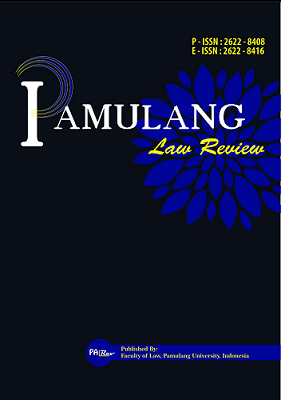Hukum Dalam Tantangan Perlindungan Penyandang Disabilitas Terhadap Kekerasan Seksual
DOI:
https://doi.org/10.32493/palrev.v7i1.43288Keywords:
Disabled Persons' Rights, Sexual Assault, Legal ProtectionAbstract
Gender-based violence is defined as any action that results in physical harm or emotional distress, including threats of harm with certain behaviors, coercion to engage in harmful behaviors, and various forms of freedom-limiting oppression.One of the most pervasive and harmful forms of HAM violation is sexual violence, which includes both overt acts of violence and those that are more covert in nature, such as those caused by cultural and societal biases against the victims. Research in the field of law is research that employs specific methodologies, frameworks, and philosophies in order to analyze a particular legal phenomenon. The key topics of this investigation are intellectual property rights and commercial secrecy. The primary laws used in this study are the Manufacturing Act of 1999. This study makes use of qualitative data analysis. To be conceited in the Ucapan Jurisprudence: Any action taken with the intention of causing another person to behave in a way that is inconsistent with their own personal values is known as ancaman or ancaman. Lack of Integrity in Concrete Work Product Expression (Memaksa and Memperkosa): To "memaksa" someone is to order them to do something, demand it of them forcefully, or coerce them into taking action without their consent. In terms of legal protection, sexual abusers who target people with disabilities should face harsher penalties than those who target those without disabilities. People with disabilities have the same rights and responsibilities as everyone else. They need special housing and protection so they don't feel stigmatized for their deficiencies. According to Article 27(1) of our Constitution, "All citizens of a country are equal before the law and the government and must obey those laws and that government without exception.".
References
Anwar, Moh. 2021. “Perlindungan Hukum Terhadap Anak Penyandang Disabilitas Dari Kekerasan.” Jurnal Jendela Hukum 5 (2): 17–23. https://doi.org/10.24929/fh.v5i2.1434.
Arief, Barda Nawawi. 2001. “Barda Nawawi Arief, Masalah Penegakan Hukum Dan Kebijakan Penanggulangan Kejahatan , PT. Citra Aditya Bakti, Bandung, 2001, Hlm. 56. 1 1,” 1–24.
Azhar, Jihan Kamilla, Eva Nuriyah Hidayat, and Santoso Tri Raharjo. 2023. “Kekerasan Seksual: Perempuan Disabilitas Rentan Menjadi Korban.” Share : Social Work Journal 13 (1): 82. https://doi.org/10.24198/share.v13i1.46543.
Hardianti, Firda Yanis, Reno Efendi, Putri Diah Lestari, and Elisabeth Septin Puspoayu. 2021. “Urgensi Percepatan Pengesahan Rancangan Undang-Undang Penghapusan Kekerasan Seksual.” Jurnal Suara Hukum 3 (1): 26. https://doi.org/10.26740/jsh.v3n1.p26-52.
Indainanto, Yofiendi Indah. 2020. “Normalisasi Kekerasan Seksual Wanita Di Media Online.” Jurnal Komunikasi 14 (2): 105–18. https://doi.org/10.21107/ilkom.v14i2.6806.
Ira Aini Dania. 2020. “Kekerasan Seksual Pada Anak.” Ibnu Sina: Jurnal Kedokteran Dan Kesehatan - Fakultas Kedokteran Universitas Islam Sumatera Utara 19 (1): 46–52. https://doi.org/10.30743/ibnusina.v19i1.15.
Jamaludin, Ahmad. 2021. “Perlindungan Hukum Anak Korban Kekerasan Seksual.” JCIC : Jurnal CIC Lembaga Riset Dan Konsultan Sosial 3 (2): 1–10. https://doi.org/10.51486/jbo.v3i2.68.
Khairani. 2013. “Lex Crimen Vol. IV/No. 1/Jan-Mar/2015.” Buletin Jendela Data Dan Informasi Kesehatan IV (1): 29–33.
Nurisman, Eko. 2022. “Risalah Tantangan Penegakan Hukum Tindak Pidana Kekerasan Seksual Pasca Lahirnya Undang-Undang Nomor 12 Tahun 2022.” Jurnal Pembangunan Hukum Indonesia 4 (2): 170–96. https://doi.org/10.14710/jphi.v4i2.170-196.
Ramadhan, Dylan Aldianza, Alfia Septiani Solekhah, and Fitrah Marinda. 2021. “Revisi Undang-Undang Perlindungan Disabilitas: Aksesibilitas Perlindungan Hukum Terhadap Kekerasan Seksual.” Ikatan Penulis Mahasiswa Hukum Indonesia Law Journal 1 (2): 206–24. https://doi.org/10.15294/ipmhi.v1i2.53331.
Rofiah, S. 2017. “Harmonisasi Hukum Sebagai Upaya Meningkatkan Perlindungan Hukum Bagi Perempuan Penyandang Disabilitas Korban Kekerasan Seksual.” Qawwam 11 (September 2016): 133–50. https://journal.uinmataram.ac.id/index.php/qawwam/article/view/747.
Siti Faridah. 2019. “Lemahnya Penegakan Hukum Dalam Kasus Kekerasan Terhadap Perempuan Penyandang Disabilitas.” Lex Scientia Law Review 3 (1): 15–29.
Solehati, Tetti, Riezky Fajri Septiani, Rizka Muliani, Selly Amalia Nurhasanah, Sifa Nur Afriani, Sifa Nuraini, Sifva Fauziah, et al. 2022. “Intervensi Bagi Orang Tua Dalam Mencegah Kekerasan Seksual Anak Di Indonesia: Scoping Review.” Jurnal Obsesi : Jurnal Pendidikan Anak Usia Dini 6 (3): 2201–14. https://doi.org/10.31004/obsesi.v6i3.1914.
Widyaningtyas, Prasita Ayu, and Rita Damayanti. 2022. “Perilaku Pencarian Bantuan Oleh Perempuan Disabilitas Penyintas Kekerasan Seksual (Studi Kasus Di Lembaga X Yogyakarta).” Perilaku Dan Promosi Kesehatan: Indonesian Journal of Health Promotion and Behavior 4 (2): 8. https://doi.org/10.47034/ppk.v4i2.6096.
Wirayatni, Supadmi, Putri Andini, Tantimin, and Vera Ayu Riandini. 2021. “Perlindungan Anak Perempuan Penyandang Disabilitas Sebagai Korban Kekerasan Seksual Incestdi Kota Batam, Indonesia.” Jurnal Media Komunikasi Volume 3 N (1): 14–21.
Yelvita, Feby Sri. 2022. “No Titleהכי קשה לראות את מה שבאמת לנגד העינים.” הארץ, no. 8.5.2017: 2003–5.
Zahirah, Utami, Nunung Nurwati, and Hetty Krisnani. 2019. “Dampak Dan Penanganan Kekerasan Seksual Anak Di Keluarga.” Prosiding Penelitian Dan Pengabdian Kepada Masyarakat 6 (1): 10. https://doi.org/10.24198/jppm.v6i1.21793.
Downloads
Published
How to Cite
Issue
Section
License

This work is licensed under a Creative Commons Attribution-ShareAlike 4.0 International License.
Penulis yang artikelnya diterbitkan pada Jurnal Pamulang Law Review ini menyetujui persyaratan berikut:
- Penulis memiliki hak cipta dan memberikan hak jurnal untuk publikasi pertama dengan karya yang secara simultan dilisensikan di bawah Creative Commons Attribution License yang memungkinkan orang lain untuk berbagi karya dengan pengakuan kepengarangan karya dan publikasi awal dalam jurnal ini.
- Penulis dapat mengadakan perjanjian kontrak tambahan yang terpisah untuk distribusi non-eksklusif versi jurnal yang diterbitkan dari karya tersebut (misalnya, mempostingnya ke repositori institusional atau menerbitkannya dalam sebuah buku), dengan pengakuan atas publikasi awalnya di jurnal ini.
- Penulis diizinkan dan didorong untuk memposting pekerjaan mereka secara online (mis., Dalam repositori institusional atau di situs web mereka) sebelum dan selama proses pengajuan, karena dapat menyebabkan pertukaran yang produktif, serta kutipan yang lebih awal dan lebih besar dari karya yang diterbitkan. Lihat (The Effect of Open Access).










